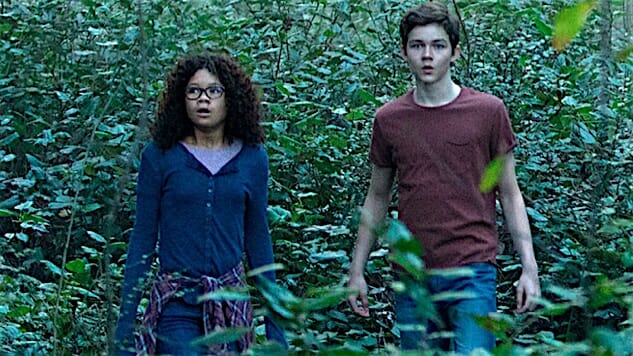A Wrinkle in Time

1. A Wrinkle in Time is a total groaner, a movie that wants to soar into the heavens but is weighed down by all the lead in its boots. This is one of those movies in which every character is constantly giving speeches, from the very beginning, about love, and the nature of love, and how powerful love is, and what it means to love, but it never seems particularly invested in love as anything other than something for everyone to look off into the distance and drone portentously about. Everyone involved appears appropriately earnest, but in a self-serving and completely airless way: It is less a movie for and about children than it is a movie by adults trying to show other adults that they are making a movie for and about children, which is something different entirely. There are movies that fail because they are misguided, or because their heart isn’t in the right place. This movie wants to be special, which makes the fact it is such a lumpy, clumsy mess all the more frustrating. You root for this movie, and the movie tries to go a long way on that good will. It doesn’t make it far.
2. The movie starts promisingly enough, with a father (Chris Pine) and his daughter Meg (Storm Reid) in his lab, enjoying each other’s company, clearly connected and adoring of each other. I know it would veer far from the book’s vision, but I find myself, typing this now, wishing we could have just stuck with those two, in that room. Alas: The father is a renowned physicist—along with his equally renowned physicist wife (Gugu Mbatha-Raw)—who believes the universe can be found in one’s mind and then proves it by disappearing from his family for four years. (We are told this information, in typically clunky fashion, by a television news item, as if there is a channel dedicated solely to this individual family that is only turned on when we need something explained.) Then, suddenly, very suddenly, Meg’s little brother Charles Wallace (Deric McCabe) is visited by three otherworldly figures called the Missus, Mrs. Who (Mindy Kaling), Mrs. Whatsit (Reese Witherspoon) and Mrs. Which (Oprah Winfrey), who cart the family, along with Meg’s generic love interest, across the universe to find Dad.
3. It is possible the plot of the book (which I have not read) is as simplistic as the plot of the movie, but I’ll confess I doubt it. The Missus dart around the universe with the kids, dispensing all sort of thick advice delivered in empty, blinking would-be whimsy. Everything about the Missus is pitched at a level too high; director Ava DuVernay clearly finds them more charming than you likely will. (Witherspoon, in particular, looks fully aware how stranded she is.) A Wrinkle in Time turns into a road movie for its middle third, as we hop from one spot to another until landing on The It, which is poorly defined but still serves as the de facto villain for the last third. Eventually the Missus leave, and the kids must find Dad and battle The It, though I’m still not entirely certain what The It is or what It wants. It struck me mostly like the negative slime in Ghostbusters 2. It’s mostly just bad vibes.